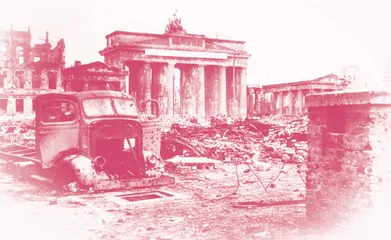Aftermath Is a Piercing Study of Germany After 1945《后果》深度解读二战后的德国
作者: 刘唱译

The road from the Third Reich to modern Germany began in a field of rubble. The second world war had left behind enough of it to form a mountain 4,000 metres high, if it were piled up on the Nazi party rally grounds in Nuremberg. When the war ended, citizens began clearing it all up. Several towns forced exNazis to do the heavy lifting. Famously, “rubble women”, wearing frocks, boots and headscarves, formed bucket chains and made salty faces for Allied cameras as they worked. Some dressed elegantly, having taken only their best clothes to the airraid shelters.
从第三帝国到现代德国的重建之路始于一片残垣断壁。如果把二战留下的废墟堆在位于纽伦堡的纳粹党集会场地上,这些东西足以形成一座4000米高的山。战争结束后,德国人开始清理工作。在一些城镇,前纳粹分子被强制去干那些重体力活儿。其中非常出名的是“废墟清理女工”,在同盟国镜头的记录下,她们身着工装、脚穿靴子,头裹头巾,组成链式人力运输线,一脸怨恨。有些人则穿着得体,显然之前去防空洞时只带了最好的衣服。
Manual labour forestalled soulsearching, writes Harald Jähner in “Aftermath”1, an erudite account of the postwar decade in Germany, now published in English. “How does a nation in whose name many millions of people were murdered talk about culture and morality?” he asks. “Would it be better, for decency’s sake, to avoid talking about decency altogether?” The philosopher Hannah Arendt noticed Germans squirming to change the subject on learning she was Jewish. Instead of asking after her family, they described their own wartime suffering. Mr. Jähner notes Germany’s “extraordinary feat of repression”, but wonders if “behind the wounding obduracy of [Arendt’s] German acquaintances, rather than pure heartlessness, there might not have been a degree of shame”.
作家哈拉尔德·雅纳在其作品《后果》一书中写道,体力劳动阻碍了自我反省。这本书是对德国战后十年的广博描述,现在出了英文版。“以一国之名杀害数百万人的国家如何谈论文化和道德?”他在书中如是发问,“为了体面,干脆对体面本身避而不谈岂不是更好?”哲学家汉娜·阿伦特注意到,在与德国人交谈时,当得知她是犹太人,他们就会局促不安,试图改换话题。他们没有问候她的家人,而是叙说自身在战争中的苦难遭遇。雅纳先生提及了德国“非同一般的压抑表现”,但他想知道,是否“在[阿伦特的]那些德国熟人令人痛心的顽固背后,不是纯粹的无情,而可能是没有多少羞耻心”。
Shame’s hue varied with experience. German soldiers, starving and humiliated, came home to find unrecognisable children and emboldened wives who had assumed control of society. In a queasy stopgap measure, many of the few surviving Jews were separated again, in part for their own protection, this time in repatriation camps administered by the Allies.
羞耻心因经历不同而不同。饥饿不堪、蒙羞受辱的德国士兵回到家中,发现儿女已认不出模样,发现妻子变得胆大自信,已然成为社会的顶梁柱。政府颁布了一项让人不安的临时措施,为数不多的幸存的犹太人中有很多被再次隔离,部分原因是为让他们自我保护,这次的隔离地是盟军管理的遣返营。
Meanwhile a total of 40m people displaced in Germany had to find their way home, or start again somewhere new. Mr. Jähner memorably portrays the crushed and guilty nation as a busy crossroads: “Footage from the summer of 1945 in Berlin shows everyone charging about in all directions: Russian and American soldiers, German police, gangs of youths, families dragging their belongings through streets on handcarts, scruffy homecomers, invalids on crutches, smart-suited men, cyclists in collar and tie, women with empty rucksacks, women with full rucksacks, and certainly many more women than men.”
与此同时,德国共有4000万人流离失所,他们不得不自己想办法回家,或者找个新地方开始新生活。雅纳先生的文字令人印象深刻,他将这个遭到镇压、满身罪孽的国家描绘成一个繁忙的十字路口:“拍摄于柏林1945年夏天的视频片段显示,人们正四散奔走:有俄罗斯和美国士兵、德国警察、成群结队的年轻人、用手推车拉着全部家当的拖家带口的人、邋遢的归客、拄着拐杖的残疾人、穿着时髦的男人、西装革履骑着自行车的人,还有背包或空或鼓的女人,当然,女人比男人多得多。”
Primitive concerns dominated German life until the late 1940s. It was a “time of wolves” that saw widespread looting and hoarding, excess and privation existing side by side. One newspaper reported several people drowning in kneedeep wine from smashed casks in a Munich cellar. Ration cards guaranteed a mere 1,550 calories per day and led to a thriving black market, which authorities tried to combat with ever-harsher sentences. Officials in Saxony introduced capital punishment in 1947 to see off “food supply saboteurs”.
人的原始欲望主宰了德国人的生活,这种状况一直持续到20世纪40年代末,出自本能的忧虑主宰了德国人的生活。那是一个“狼性时代”,抢劫和囤积普遍,过剩和匮乏并存。据一家报纸报道,在慕尼黑的一个酒窖中,几个人溺亡在齐膝高的葡萄酒中,酒来自窖中被砸碎的酒桶。配给卡领到的食物仅保证每天1550卡路里的热量摄入,导致黑市交易猖獗,而当局试图以最严厉的刑罚打击黑市。萨克森的官员在1947年引入了死刑来处罚“食品供应破坏者”。
In time anarchy gave way to order, and order to the seeds of social democracy. A key step in this process, says Mr Jähner, was currency reform, when the plummeting Reichsmark was replaced with the Deutsche Mark in June 1948. Another stabilising influence was the Marshall Plan, which lent $1.4bn to West Germany (formally divided from the East in 1949). It was the only western European nation forced to repay the funds, “in order to preserve some sense of proportion between victory and defeat”. Culture revived, too, theatre receipts spiking from 1945 to 1948 before settling again. “With affluence came thrift,” notes Mr Jähner.
随着时间推移,无政府状态让位给了秩序,之后秩序又让位给了社会民主的种子,使其生根发芽。雅纳先生称,这个过程中至关重要的一环就是货币改革——1948年6月,暴跌的旧德国马克被新德国马克取代。另一个影响因素是起到稳定作用的马歇尔计划,该计划向联邦德国(1949年正式与民主德国分裂)贷款14亿美元。它是唯一一个被迫偿还这些贷款的西欧国家,“以此保持胜败之间的某种分寸感”。与此同时,文化也迎来了复兴,1945年到1948年,剧院收入激增,之后再次趋于稳定。雅纳先生指出:“随富裕而来的是节俭。”
The postwar culture boom is a rare missed opportunity in “Aftermath”. Other art forms are neglected in a chapter focused on abstract painting. For example, Germany’s midcentury compromises converge revealingly in the figure of Herbert von Karajan, a classical maestro who goes unmentioned. A Nazi party member and favourite of Hitler, the Austrian rehabilitated his image and became conductor of the Berlin Philharmonic for over three decades. Like many others in Germany, he found respectability through a combination of entitlement and amnesia.
《后果》一书罕见地没有大加描述战后的文化繁荣。在专门介绍抽象画的一章中,其他艺术形式被忽略了。例如,书中没有提及古典音乐大师赫伯特·冯·卡拉扬,德国在上世纪中叶的种种妥协在他的身上体现得淋漓尽致。这个奥地利人曾是纳粹党员和希特勒面前的红人,如今重塑了自己的形象,并担任柏林爱乐乐团的指挥30余年。像许多其他德国人一样,他的专业能力加上人们的记忆缺失让他获得了社会地位。
Midcentury Germans, says Mr Jähner, needed to see themselves as victims. The more they suffered during the war and its aftermath, the less they felt complicit in Nazi crimes. He puts German anguish in the essential context of a nation climbing out of an abyss that it created. As the historian Tony Judt wrote in “Postwar”, the conflict was a calamity “in which everyone lost something and many lost everything”. “Aftermath” is a reminder that the German experience will always stand apart.
雅纳先生说,上世纪中叶的德国人需要把自身视为受害者。他们在战争及其余波中遭受的苦难越多,就越不会觉得自己是纳粹罪行的共犯。他把德国的剧痛置于一国要从自己制造的深渊中爬出的重要背景下。正如历史学家托尼·于特在《战后》一书中所写的,这场冲突是一场灾难,“在这场灾难中,每个人都失去了一些东西,很多人失去了一切”。《后果》提醒人们,德国的经历将永远与众不同。
(译者单位:湖南师范大学)